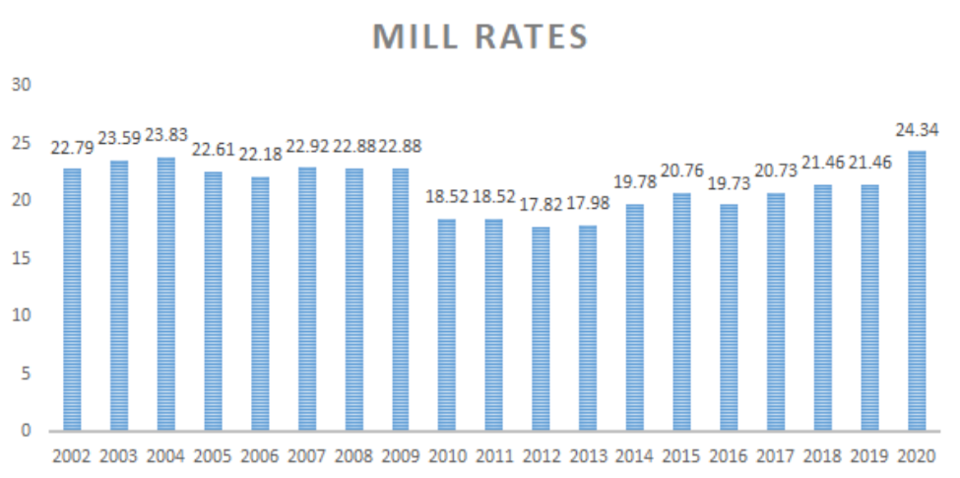The mill rate is going up, spending requests are down and the Flin Flon School Division (FFSD) is trying to stay above a rising tide of provincial cuts and increasing costly services.
The division released its 2019/20 budget Feb. 19, citing lower property values in Flin Flon as the reason for an upcoming mill rate increase. The division is not asking for any increase in the special levy they receive from the City of Flin Flon, but the mill rate will go up from 21.46 to 24.34.
The proposed mill rate is the highest mill rate proposed in a FFSD budget since at least 2002. The mill rate was under 18 in 2012.
“As a result of the overall property assessments in Flin Flon decreasing, the government reducing tax incentive grants and a decrease in the division’s percentage of the Hudbay grant-in-lieu, unfortunately, the mill rate will have to increase,” trustee Amy Sapergia Green said at the budget unveiling.
The division received 45 per cent of Hudbay’s grants-in-lieu until 2014. This year they will be receiving only 34 per cent.
The mill rate increase is also driven by the slow elimination of a provincial tax incentive grant. The division had been receiving over $700,000 in additional funding before 2018. That program is being slowly phased out by reducing the amount received by $125,452 every year. The division will receive some extra funding through the grant for two more budgets.
Division secretary-treasurer Heather Fleming said the increase in mill rate would not necessarily mean an increase in property taxes due to declining property prices.
“I had some people bring in their tax bills - for some people, it actually means the taxes will be lower than last year,” she said.
“The mill rate is multiplied against your property assessment and, for a lot of people, their assessment is down.”
The division’s budget needs final approval from the provincial government.
The division removed over $200,000 worth of requests from their budget. A number of requested items, ranging from $4,500 for student councils to $68,000 for playground equipment was not included in the final draft. The division also removed requests for additional staffing that would have cost nearly $90,000.
“That's uncommon,” Sapergia Green said.
“Most years, we are able to do more.”
The only approved funding request was funding for three additional educational assistants positions.
“This year, we really had to sit down and we said the one thing that we need to make room for is we need to continue with that EA support,” Sapergia Green said.
“Those three funded positions are the only thing that we could keep. Everything else, we are not able to support this year.”
The division had a surplus of just over $100,000 in the 2018/19 budget and is aiming for a surplus of $200,000 for this year. The division hopes to have a surplus of 2 per cent by the end of this budget.
Fleming said she wished the division had a higher surplus. The provincial government mandates divisions cannot have a surplus of over four per cent.
“A surplus of two per cent is… ehhhhh,” she said, waving her hand and wincing.
The provincial government also mandated that all divisions across Manitoba reduce administrative salaries by at least 15 per cent. FFSD chose to eliminate the division’s assistant superintendent position, cutting their administrative staff down to four.
Over 60 per cent of the division’s projected revenue comes from the provincial government.
The division reached out to the public for input on the budget, leading to a mix of people calling for both reductions and extra support for school and division programs.
French immersion at École McIsaac was the most talked about topic, with residents writing in both in support of expanding and eliminating the program. The division said 30 per cent of students at McIsaac are in the French immersion program and eliminating it would both not result in savings, but reduce opportunity for students.
“It's very similar to the feedback we got last year as well,” Sapergia-Green said on the public’s comments.
“I think the value in it is that it gives [the public] an opportunity to speak to their issues. Before, it was a lot harder to tell us what they wanted.”
Similar requests were made about school sports programs, with calls for reducing and increasing spending. In the end, funding remained the same for school sports in the division, with decisions about which sports would be prioritized left up to the schools themselves.
The budget, including comments submitted by the public, is available in full at ffsd.mb.ca.




